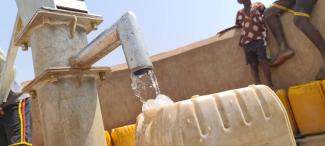"I am so grateful to USAID and BFRP for fixing our broken water sources."
- Bintou, Tangaye community member
Many people living in remote areas of the Est, Nord, and Sahel regions of Burkina Faso faced growing insecurity and repeated terrorist attacks, which forced them to flee toward bigger towns for safety reasons. However, the host communities that received these thousands of internally displaced persons (IDPs) were already struggling with economic hardships and livelihood disruptions, and as a result sometimes failed to meet their growing populations' needs. Within this context, these failed expectations translated to tensions around managing and using available resources, especially water resources, because they were already scarce and remained critical for both IDPs and host community members.
Municipalities in these regions reported issues related to failing water points, which reduces access to clean drinking water. For instance, the municipality of Tangaye in the Nord region faced difficulties with drinking water accessibility due to decreased rainfall and several water distribution system failures within the city. To access their daily supply of drinking water, community members often had to travel many miles. However, these endeavors became progressively more challenging due to increased terrorist attacks and the presence of improvised explosive devices. The population raised concerns related to these water resource issues with their municipality’s town hall, but local authorities are limited in their ability to address the matter. The inability to meet the drinkable water needs in Tangaye is unfortunately reflected across the impacted regions. There is collective frustration and heightened tension around the use of dwindling water resources in northern and eastern Burkina Faso. These feelings of abandonment by the state are then often exploited by terrorists to attract more recruits.
USAID’s Office of Transition Initiatives (OTI) Burkina Faso Regional Program (BFRP) recognized the need to support local authorities in addressing these critical water resource concerns by restoring water sources. Since 2019, BFRP has worked with authorities in strategic communes in those regions, including Gorgadji in Sahel; Solle, Thiou, Koumbri, and Tangaye in Nord; and Gayeri in Est to rehabilitate 32 hand pumps and two large-diameter wells, benefiting more than 30,000 IDPs and host community members.
Bintou, a Tangaye community member, commented on these efforts and said, "Before, the wells were not covered and there was a lot of garbage inside; now we have clean water, and I am so grateful to USAID and BFRP for fixing our broken water sources."
After the rehabilitation of each water source, a water management committee that consists of members representing host and IDP communities, and includes all ethnic and religious groups, is put in place to oversee the water source’s overall usage and ensure everyone receives equal access. BFRP also provided committee members with a three-day training that focused on countering violent extremism and their roles and responsibilities to ensure proper management of these water points. This system is fragile, but the overarching goal of the training is to encourage collaboration throughout the committee and to help build unity against potential shocks that could threaten the water management system.
Community members and authorities reported that restoring these water sources and setting up trained and empowered management committees contributed to reducing the populations’ feelings of abandonment. These actions also significantly helped deescalate frictions within the communities, mitigating future tensions and conflicts.
As Assana from Solle in the Nord region said, "Now I can have clean water without fighting for it."
https://www.usaid.gov/stabilization-and-transitions/burkina-faso

